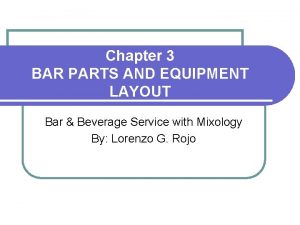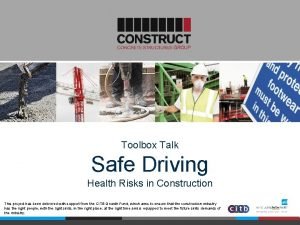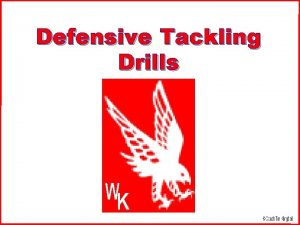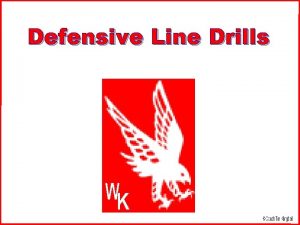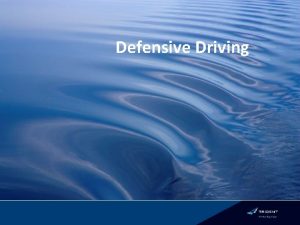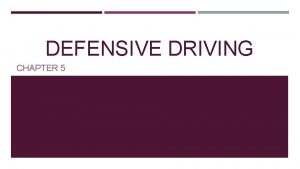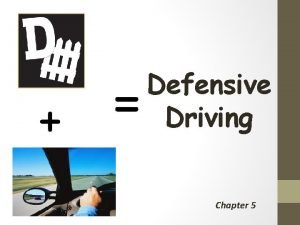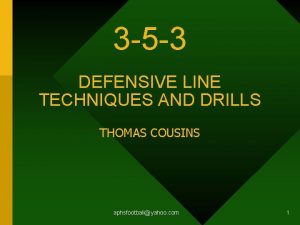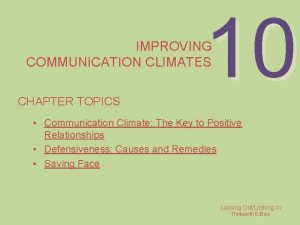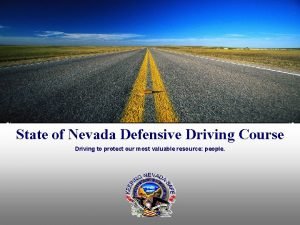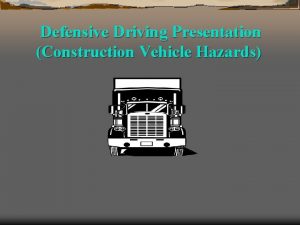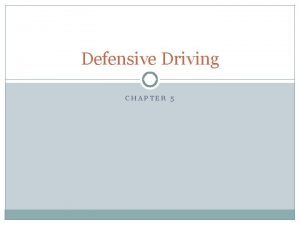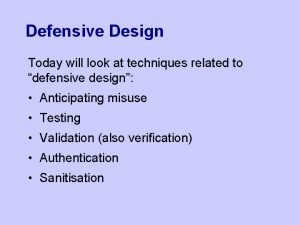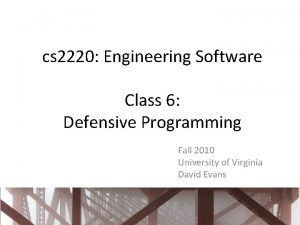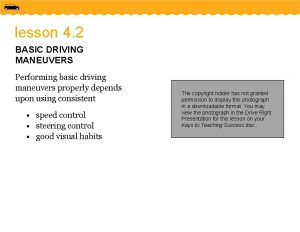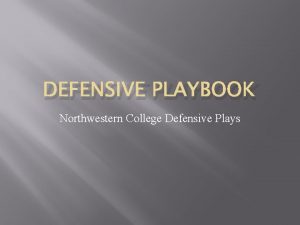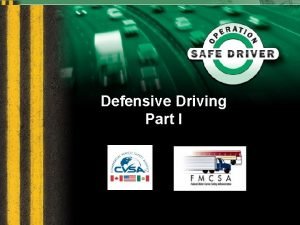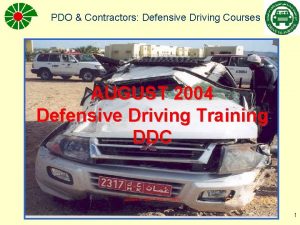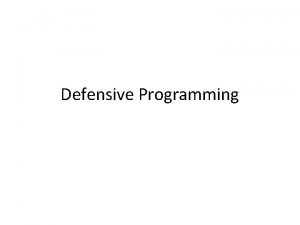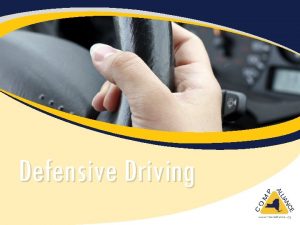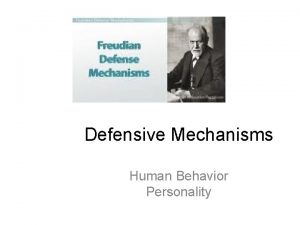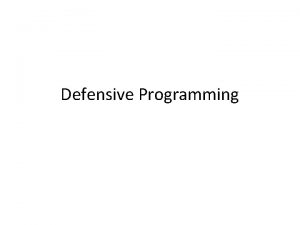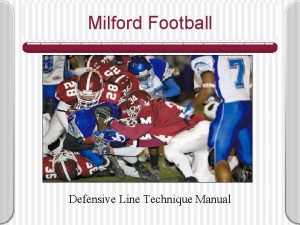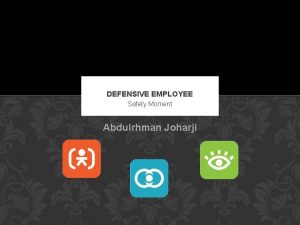Defensive DrivingDriver Review Part II Defensive DrivingDriver Review































- Slides: 31

Defensive Driving/Driver Review Part II

Defensive Driving/Driver Review 2

Defensive Driving Techniques (Continued from Defensive Driving Part I) • As we continue the list of defensive driving techniques found in the Defensive Driving Part I presentation, we begin this presentation with number #7 Backing the truck • When backing, it is important to remember the acronym GOAL (Get Out And Look) to ensure that the area is clear and backing can be done safely 3

Defensive Driving Techniques #7 Backing • Our GOAL consists of getting out of the truck and looking above and below the tractortrailer to ensure that there are no objects in the way • Walk to the back of the trailer to make sure that there are no objects or traffic behind the trailer that are unseen when looking in the mirrors 4

Defensive Driving Techniques #7 Backing Use your mirrors • Check your mirrors throughout the backing maneuver • Make sure that your backing pathway remains clear • Use a spotter when possible and maintain visual contact with your spotter at all times 5

Defensive Driving Techniques #8 Lane Travel Maintaining Your Lane of Travel • Due to the width and size of your vehicle it is important to remain fully within your lane of travel • Search far enough ahead to determine necessary lane changes and exits • Signal your intentions of changing lanes well in advance 6

Defensive Driving Techniques #8 Lane Travel Lane Changes • When using an entrance ramp onto a highway, signal your intentions to merge and enter with the flow of traffic • Allow a four second following distance at all times, in inclement weather this distance should at the very least be doubled 7

Defensive Driving Techniques #8 Lane Travel • Awareness of brake lights will • • allow you to safely react to changing traffic conditions It takes 3/4 of a second from the moment your brain recognizes danger and then sends the signal to your foot to move from the accelerator, to when your foot actually applies the brake At normal speeds your vehicle will have already traveled 60 feet 8

Defensive Driving Techniques #9 The No-Zone Traffic Situations • Situations occur around the front, rear and side of your vehicle Watch for vehicles tailgating • These areas are considered the No-Zone and other vehicles should not remain there • We need to remain vigilant at all times 9

Defensive Driving Techniques #9 The No-Zone Keep in mind the No-Zone areas around your vehicle • Check your side mirrors often for vehicles entering your No. Zone • Watch for vehicles that may be tailgating • Remember the importance of situational awareness and proper reactions to other drivers’ bad driving behaviors 10

Defensive Driving Techniques #9 The No-Zone • Importance of compensating for other drivers’ bad driving decisions Take every opportunity to educate the public regarding cutting off trucks • When other vehicles cut you off, be prepared to back-off and allow a 4 second following distance to be established 11

Defensive Driving Techniques #10 Entering Curves Slowly Curves in Road • Slow down when approaching curves in the roadway • Keep in mind the capability of your vehicle and the type of load you may be transporting • When entering a curve observe truck speed limits and do not place yourself or vehicle in a dangerous situation 12

Defensive Driving Techniques #10 Entering Curves Slowly Load Shift Crash • Load shifts can result in serious consequences • Curves in roads can be deceiving • Operate your vehicle in a safe manner at all times 13

Defensive Driving Techniques #11 Plan Your Route Before Leaving Route Planning • Plan your route well before transporting your load • Removing one or more hands from the wheel to enter locations on a GPS or navigation device is as dangerous as texting while driving 14

Defensive Driving Techniques #12 Do Not Fixate on Non-driving Objects Keep Your Eyes on the Road • Keep your eyes on the road and restrict glances away from road to one second or less • Focus on the potential driving hazards you may encounter 15

Defensive Driving Techniques #13 Turn Off Your Cell Phone While Driving • Turn off your cell phone while driving • Focus your attention on the driving task at hand • Federal regulations prohibit texting or the use of hand held devices while driving a commercial motor vehicle ü 49 CFR 392. 80 and 392. 82 16

Defensive Driving Techniques #14 Avoid Distractions While Driving Three types of Distractions • Manual (Hands) • Visual (Eyes) • Cognitive (Head) 17

Defensive Driving Techniques #14 Avoid Distractions While Driving Distractions • Manual ü (Distractions that take one or both hands off the steering wheel while driving) ü Changing the station on a radio ü Grooming ü Eating ü Talking and Texting on cell phone 18

Defensive Driving Techniques #14 Avoid Distractions While Driving Distractions • Visual ü Distractions that take our eyes off the road ü Looking at billboards ü Looking at non-driving objects ü Talking and Texting on cell phone 19

Defensive Driving Techniques #14 Avoid Distractions While Driving Distractions • Cognitive ü Anything that takes a driver’s mind, thoughts or mental attention away from the task of driving ü Anger ü Anxiety ü Fatigue ü Pain or worry ü Daydreaming 20

Defensive Driving Techniques #15 Avoid Medications That May Affect Your Driving Abilities Prescription and Non. Prescription Medicines • Many prescription medications can affect a drivers capability to operate a vehicle safely • Many over-the-counter medications also impact on your performance • Make sure your physician is aware that you operate commercial motor vehicles for a living and you talk with him/her about these medications 21

Defensive Driving Techniques #15 Avoid Medications That May Affect Your Driving Abilities Medicines • Know the side effects of medication you may be taking • Follow instruction posted on the warning labels • Do not drive if medication causes drowsiness 22

Defensive Driving Techniques #15 Avoid Medications That May Affect Your Driving Abilities Medication Addiction • It is easy to become addicted to medications, prescribed or otherwise • At the first sign of addiction contact your physician for help with the situation • Seek out safety personnel and ask for help with your addiction 23

Other Substances To Avoid Amphetamines & Methamphetamines • Methamphetamines ‘Meth’ continue to be the drug of choice for many individuals • It can create the effect of heightened senses • However, the dangers of ‘Meth’ use far outweigh any benefit that may be perceived 24

Other Substances To Use On a Limited Basis Energy Drinks • May provide a short-term benefit to driving drowsy • However, use should be limited • More research needs to be conducted to determine long term effects of these products on the human body 25

Other Substances To Use On a Limited Basis Coffee and Caffeinated Beverages • May also provide a short term benefit to driving drowsy • However, usage should also be limited, according to recent research studies 26

Defensive Driving Techniques • There are other defensive driving techniques than those shown during this presentation • Feel free to discuss them with safety personnel • These driver safety presentations have been developed through the Commercial Vehicle Safety Alliance “Operation Safe Driver” Program provided through a grant by FMCSA 27

Operation Safe Driver • Mission ü Improve commercial and non-commercial driver behavior and performance through effective enforcement, education and awareness strategies. • Message ü Improving highway safety for commercial vehicle operations starts with the driver. ü Highway crashes related to large trucks and buses account for 12 percent of the total highway fatal crashes. ü Focusing more attention on commercial and non-commercial drivers operating in an unsafe manner around commercial vehicles will save lives. 28

Outreach • Training program(s); which include five Train-the-Trainer Kits that contain five separate Power. Point presentations, between 25 to 35 minutes each on the following subjects 1) Defeating Distracted Driving 2) Beyond Distracted Driving 3) Following the Rules of the Road 4) Defensive Driving/Driver Review I 5) Defensive Driving/Driver Review II 29

Web Site • www. operationsafedriver. com • Access to files for downloading Train-the-Trainer Kits (5) ü Defeating Distracted Driving ü Beyond Distracted Driving ü Following the Rules of the Road ü Defensive Driving/Driver Review Part II DVDs (2) ü Defeating Distracted Driving ü New Entrant Drivers All training materials provided at no cost and available to meet your individual training needs 30

Thanks for your time! www. operationsafedriver. com 31
 Chapter review motion part a vocabulary review answer key
Chapter review motion part a vocabulary review answer key Addition symbol
Addition symbol Unit ratio definition
Unit ratio definition Part part whole
Part part whole What is a technical description?
What is a technical description? Bar parts and layout
Bar parts and layout The phase of the moon you see depends on ______.
The phase of the moon you see depends on ______. Two way anova minitab 17
Two way anova minitab 17 Defensive interval ratio
Defensive interval ratio Defensive driving toolbox talk
Defensive driving toolbox talk Michigan state police teenage defensive driving
Michigan state police teenage defensive driving Defensive interval ratio
Defensive interval ratio Angle tackle
Angle tackle Defensive end drills with cones
Defensive end drills with cones Ddc collision prevention formula
Ddc collision prevention formula Chapter 5 defensive driving
Chapter 5 defensive driving To avoid collisions a defensive driver should
To avoid collisions a defensive driver should Defensive behaviors can escalate in any order
Defensive behaviors can escalate in any order Defensive line techniques
Defensive line techniques Assertive message format
Assertive message format Nevada defensive driving
Nevada defensive driving Defensive realism definition
Defensive realism definition Defensive driving training course ppt
Defensive driving training course ppt Most accidents are caused by _________ driving error
Most accidents are caused by _________ driving error Two examples of defensive design
Two examples of defensive design Defensive programming java
Defensive programming java Non defensive learning
Non defensive learning Imitative strategy
Imitative strategy Midblock u turn steps
Midblock u turn steps Defensive self esteem
Defensive self esteem Crisis development model
Crisis development model Sap 14
Sap 14





